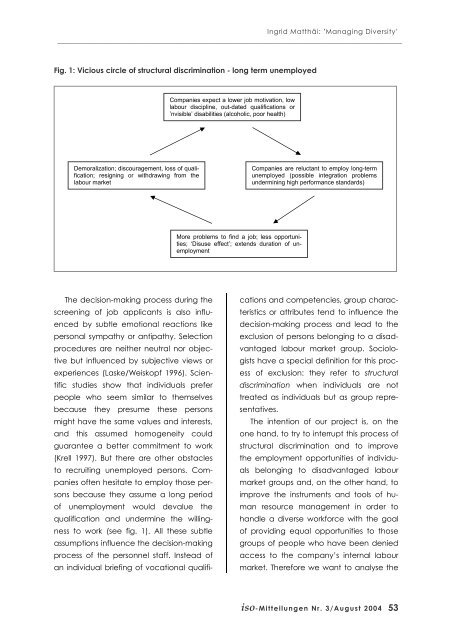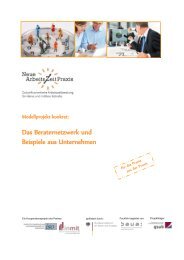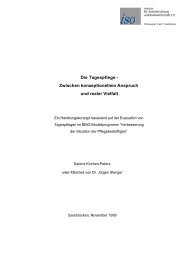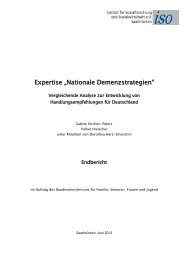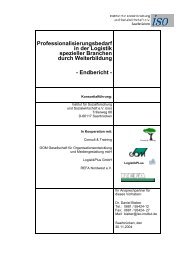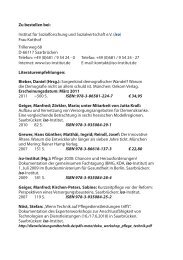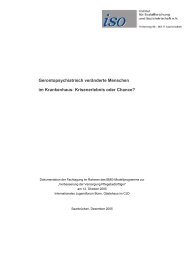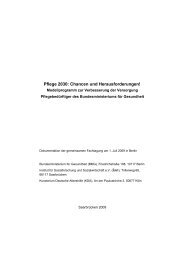iso-NEWS - Institut für Sozialforschung und Sozialwirtschaft eV
iso-NEWS - Institut für Sozialforschung und Sozialwirtschaft eV
iso-NEWS - Institut für Sozialforschung und Sozialwirtschaft eV
Erfolgreiche ePaper selbst erstellen
Machen Sie aus Ihren PDF Publikationen ein blätterbares Flipbook mit unserer einzigartigen Google optimierten e-Paper Software.
Ingrid Matthäi: ’Managing Diversity’<br />
__________________________________________________________________________________________<br />
Fig. 1: Vicious circle of structural discrimination - long term unemployed<br />
Demoralization; discouragement, loss of qualification;<br />
resigning or withdrawing from the<br />
labour market<br />
The decision-making process during the<br />
screening of job applicants is also influenced<br />
by subtle emotional reactions like<br />
personal sympathy or antipathy. Selection<br />
procedures are neither neutral nor objective<br />
but influenced by subjective views or<br />
experiences (Laske/Weiskopf 1996). Scientific<br />
studies show that individuals prefer<br />
people who seem similar to themselves<br />
because they presume these persons<br />
might have the same values and interests,<br />
and this assumed homogeneity could<br />
guarantee a better commitment to work<br />
(Krell 1997). But there are other obstacles<br />
to recruiting unemployed persons. Companies<br />
often hesitate to employ those persons<br />
because they assume a long period<br />
of unemployment would devalue the<br />
qualification and <strong>und</strong>ermine the willingness<br />
to work (see fig. 1). All these subtle<br />
assumptions influence the decision-making<br />
process of the personnel staff. Instead of<br />
an individual briefing of vocational qualifi-<br />
Companies expect a lower job motivation, low<br />
labour discipline, out-dated qualifications or<br />
’nvisible’ disabilities (alcoholic, poor health)<br />
More problems to find a job; less opportunities;<br />
‘Disuse effect’; extends duration of unemployment<br />
Companies are reluctant to employ long-term<br />
unemployed (possible integration problems<br />
<strong>und</strong>ermining high performance standards)<br />
cations and competencies, group characteristics<br />
or attributes tend to influence the<br />
decision-making process and lead to the<br />
exclusion of persons belonging to a disadvantaged<br />
labour market group. Sociologists<br />
have a special definition for this process<br />
of exclusion: they refer to structural<br />
discrimination when individuals are not<br />
treated as individuals but as group representatives.<br />
The intention of our project is, on the<br />
one hand, to try to interrupt this process of<br />
structural discrimination and to improve<br />
the employment opportunities of individuals<br />
belonging to disadvantaged labour<br />
market groups and, on the other hand, to<br />
improve the instruments and tools of human<br />
resource management in order to<br />
handle a diverse workforce with the goal<br />
of providing equal opportunities to those<br />
groups of people who have been denied<br />
access to the company’s internal labour<br />
market. Therefore we want to analyse the<br />
<strong>iso</strong>-Mitteilungen Nr. 3/August 2004 53


